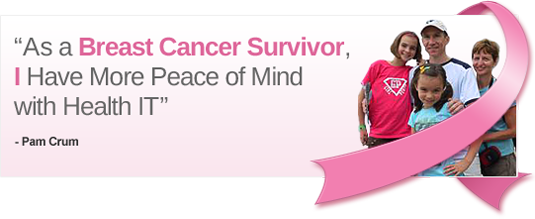Pam Crum


“As a Breast Cancer Survivor, I Have More Peace of Mind
with Health IT”
When Pam Crum was pregnant, the last thing she expected was a diagnosis of stage 3B inflammatory breast cancer. Ill and terrified, she had to spend hours driving her mammograms and other images from doctor to doctor. Today, Ms. Crum is a seven-year cancer survivor and the busy mom of two. Because her medical team switched to electronic health records, she’s no longer chauffeuring her mammograms and other scans around town – which gives her more time to chauffeur her kids.
I was 22 weeks pregnant when I was diagnosed with stage 3B inflammatory breast cancer. I had chemotherapy before my daughter was born, and I have pictures of me holding her right after she was born at Georgetown University Hospital, where I also receive cancer care. I had on a scarf, because I was bald, and she had a full head of hair. But, most importantly, my baby girl was healthy. It felt like a miracle.
After my daughter was born, I had additional chemotherapy, a mastectomy, and radiation. I’m still taking medication to reduce the risk of recurrence and following up with doctors, of course. We were so very fortunate. Today, I have healthy 6- and 10-year-old daughters, and it’ll be seven years since my breast cancer diagnosis this November.
Shuttling Scans from Doctor to Doctor
I do not have my mammograms taken at Georgetown University Hospital, because my insurance company requires me to do them in Virginia. What that meant before Georgetown adopted electronic health records is that whenever I had a mammogram, or an MRI, or an ultrasound, I would have to go and pick up the images, take them to and from doctor to doctor, and then take them back to the imaging facility. So I did lot of shuttling of my images.
Electronic Health Records: Easier For Me
I’ve watched as Georgetown has gone from paper-based to electronic health records over the last several years. I feel that electronic health records have not only made it easier for me, but have also increased the quality of my medical care.
I’m going to doctors a minimum of six times a year for check-ups. But today, I don’t do any physical shuttling of the films. It’s fantastic. Now when I go and have the images made, the imaging center says, “We’ll electronically send the scans to your doctors.” And then, by the time I see my doctors, they tell me, “I looked at your scans. Everything looks fine.” It makes the whole process go smoother.
Also, my oncologists at Georgetown can look at my electronic health record and see what blood tests are due, and put everything on the same order for the blood draw. I used to have two separate pieces of paper for the draws, and sometimes it meant separate trips to the lab. So, that’s better too.
I have a lot of different medications, including my cancer drugs and dietary supplements. Every time I go in for an appointment, they need to know what I’m taking. I used to have to make a new list each time! That’s hard, especially when you need to recall all the proper dosages. Since Georgetown moved to its electronic system, my providers just hand me a paper that shows what I was taking last time, and it’s so much easier for me to take a look and say what’s changed and what hasn’t. I just feel like they get a better picture of my medication currently and historically. And it’s easier for me.
Since all my providers can see the results of all my scans and tests and know exactly what medications I’m on, I feel like I’ve got more people monitoring my health, being able to see something that might be of concern. And I feel they have better access to the full picture of my health. I think this translates to better medical care. When you’ve had cancer, it’s a huge peace of mind to feel like everything is being done to make sure that I stay healthy and cancer-free.
Mentoring Breast Cancer Patients
I’ve been a volunteer with Georgetown University Hospital’s SOS (Survivors Offering Support) program for about two years. I’ve mentored three or four women over a period of time. My type of cancer is rare, so I’ve also done phone calls to answer questions from women who have that same diagnosis or who are pregnant when they receive breast cancer treatment. I’ve also talked to women who are thinking about reconstruction surgery.
When I was diagnosed with breast cancer during my pregnancy, it was just devastating. We didn’t know how this was going to turn out. But it turned out beautifully, we were so very fortunate.

